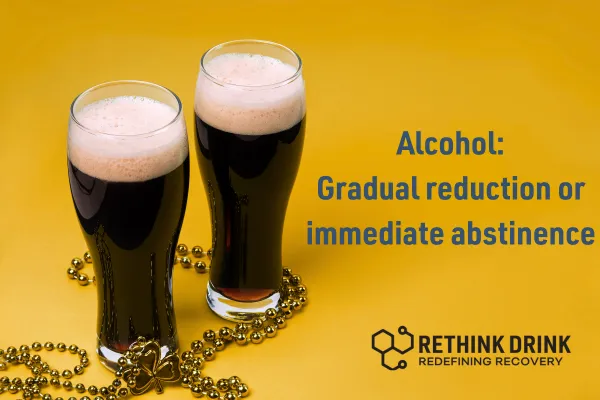
Gradual Reduction vs Immediate Abstinence: Why a Softer Approach to Alcohol Works Better
Key Takeaways:
Gradual reduction offers a more emotionally and psychologically sustainable path to freedom from alcohol.
Immediate abstinence may increase the risk of relapse and emotional distress.
The Sinclair Method provides a structured, science-backed way to reduce drinking over time.
Physical health often improves steadily without the shock of sudden withdrawal.
Tailored support and coaching, like at Rethink Drink, make gradual change even more effective.
Understanding the Journey: All or Nothing vs One Step at a Time
When it comes to changing our relationship with alcohol, many of us are told there's only one way: stop drinking completely, right now. But what if that approach is too harsh—too unforgiving—for where we're at emotionally, psychologically, or even physically?
At Rethink Drink, we see it differently. We support a growing number of people who are choosing a gradual reduction approach, often using tools like The Sinclair Method (TSM). And we’re seeing powerful, long-term change without the all-or-nothing pressure.
Immediate Abstinence: What’s the Catch?
Immediate abstinence—cutting out alcohol overnight—has long been the conventional route. It can work for some, particularly those in high-risk situations, but it isn’t without pitfalls:
Challenges of Immediate Abstinence:
Sudden withdrawal symptoms such as anxiety, insomnia, or shakes
High risk of relapse, especially if a "slip-up" leads to guilt or bingeing
Emotional overwhelm or feelings of deprivation
Difficulty socialising and avoiding events due to pressure to stay sober
While this method can be necessary in some clinical settings, for many of us, it brings more struggle than success.
Gradual Reduction: Why It Just Makes Sense
Now, compare that with gradual reduction. It’s gentler, more forgiving, and grounded in neuroscience.
Emotional Benefits:
Builds confidence slowly without fear of failure
Fosters a sense of control and autonomy over the process
Reduces guilt and shame associated with drinking
Psychological Benefits:
Avoids the all-or-nothing trap that can lead to defeat
Encourages the brain to rewire habits gradually
Makes room for reflection, learning, and growth along the way
Physical Benefits:
Allows the body to adapt slowly, avoiding shock or severe withdrawal
Improves liver health, sleep, energy levels, and digestion steadily
Supports better long-term wellness without abrupt disruption
How The Sinclair Method Supports Gradual Reduction
The Sinclair Method is a medical approach based on pharmacological extinction. It uses Naltrexone, taken one hour before drinking, to gradually reduce alcohol’s rewarding effects in the brain.
Key Components of TSM:
Take Naltrexone before each drinking session
Continue drinking mindfully during the process
Notice cravings and consumption decrease naturally over time
Work with a coach or support system for best results
By dulling the brain's reward response to alcohol, TSM allows cravings to fade—naturally and without trauma. It’s a science-backed way to regain choice and balance.
You can read more insights and real-life experiences on our blog, where we highlight how gradual change leads to long-term success.
Real-World Benefits We’ve Seen at Rethink Drink
At Rethink Drink, we see the power of gradual change every day. Through structured support, coaching, and evidence-based methods, our clients:
Rebuild trust with themselves and their choices
Reduce alcohol use without shame, guilt, or secrecy
Improve their emotional resilience and self-esteem
Reconnect with loved ones and social circles without pressure
Develop healthier physical habits over time
If you’re considering this journey, we offer a compassionate and personalised start with a free screening call. It’s your opportunity to talk things through—no pressure, no judgement.
To see more about how we work and who we are, visit our homepage. There’s a better way to drink less, and it starts with rethinking everything you’ve been told about change.


